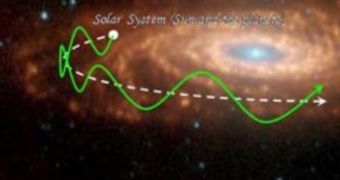At least five mass extinctions may have occurred in the history of our planet, meaning that in a relatively short period of time, a large number of species have disappeared. Probably the most famous one took place 65 million years ago at the end of the Cretaceous period, when the dinosaur domination reached its end.
There is an interesting, yet highly controversial theory, claiming that it might not have been only the huge asteroid impact, but also a massive dose of cosmic radiation, produced by the galaxy itself at a supposedly regular interval.
According to Adrian Melott, professor of physics and astronomy at Kansas University, the circular movement of our solar system within the galaxy, regularly exposes Earth "to an onslaught of cosmic rays on a schedule that is synchronized to the mass extinctions."
Mellott and colleague Mikhail Medvedev "hypothesize that the leading, north side of the Milky Way generates a shock wave as the galaxy plunges through the universe". The Kansas researchers discovered that high rates of extinction in the cycle coincide almost perfectly with periodic "excursions" of the solar system outside the central plane of the Milky Way galaxy. "When the solar system periodically journeys up to the boundary of the galaxy [in the direction of its movement across the Universe] -- about once every 64 million years -- the galactic shock wave exposes Earth to a huge dose of high-energy radiation."
According to them, our planet is rapidly heading for the bad galactic neighborhood: "We've just passed the mid-plane of the galaxy," said Melott. "We're on the way up and we'll reach a peak in about 10 or 12 million years. That's when the radiation should start getting bad again -- if our idea is right."
However, there are some problems with this theory, that make it at least hasty if not clearly undocumented; that doesn't necessarily mean that the scientists don't know what they're talking about, it may just mean that they are making some assumptions without scientifically proven evidence.
First of all, there is strong evidence of the impact that caused the extinction of the dinosaurs, so the cosmic rays are at best a secondary cause. An adjacent proposal says that cosmic rays are not the only cause of such an extinction, and that the galactic shock wave also produces much more numerous asteroids and comets, disrupting them and making them speed in the opposite direction to the galactic movement. Maybe the one that hit us and caused the dinosaurs to disappear was one of those "disturbed" asteroids...maybe not.
But the most important counter argument is the fact that we should have observed the effects of the cosmic radiation in plants and other animals that survived the dinosaur die-off. Animals that suffered mutations would have been less significant in percentage, it's true, but the mutations should have been passed on to the descendants, and we should have seen this kind of evidence by now.
It is highly unlikely for a massive dose of radiation to wipe out entire species, yet leave no trace in the surviving ones. Furthermore, if cosmic radiation was the cause of the dinosaur apocalypse, could it really have happened instantly?
Presuming that Earth is indeed heading for a danger zone, filled with radiation, there are some aspects that do not add up. It is hard to believe that the radiation is so localized, that the planet would simply enter its area of influence in an instant, so rapidly that we wouldn't even know what hit us.
Again, there is no clear limit between the "safe" and the "bad" zones, so early effects should be noticed by humans, if dinosaurs did not have the technological means to do that. And last, but not least, the speed of the Earth in space - resulting from both its movement in the galaxy and the galaxy's movement in the Universe - is not so great, so the influence of these cosmic rays would have been felt for at least a few million years, since the galactic waves form on an important part of the galaxy's circumference.
So, the bottom line is, as much as humans enjoy apocalyptic scenarios (and this can be clearly seen in so many Hollywood movies) I really doubt the making of another one, called: "Cosmic Rays of Doom" or something like that. It was a good try, though, and the two scientists got their 15 minutes of fame...

 14 DAY TRIAL //
14 DAY TRIAL //